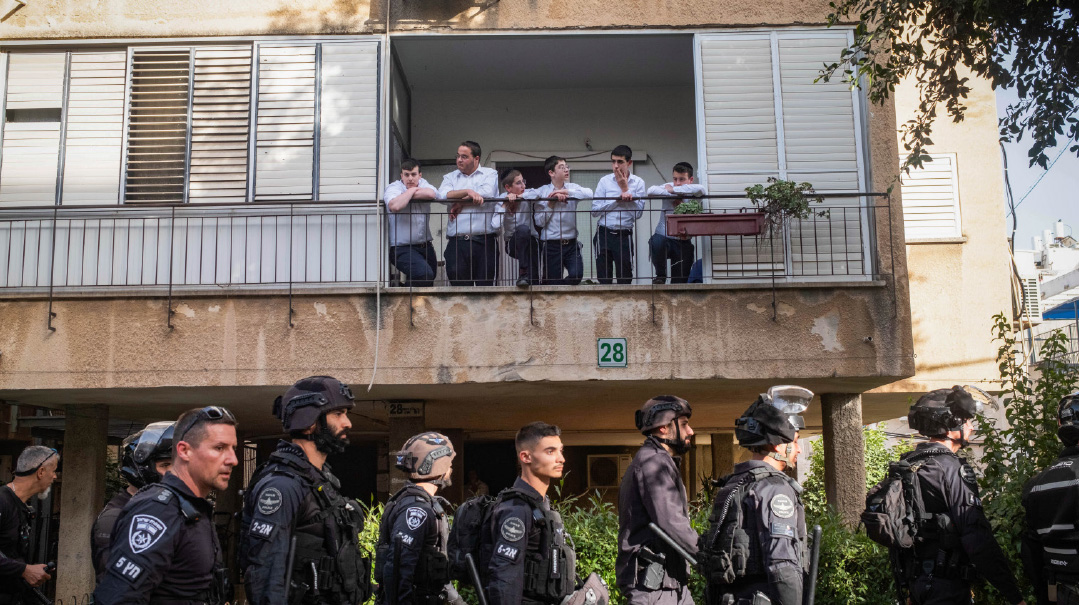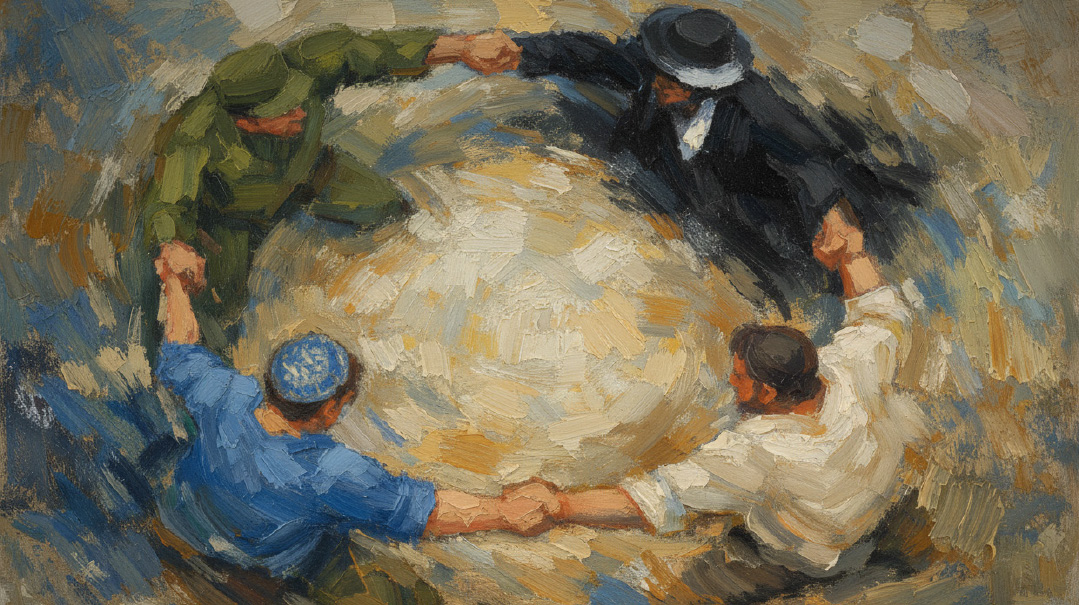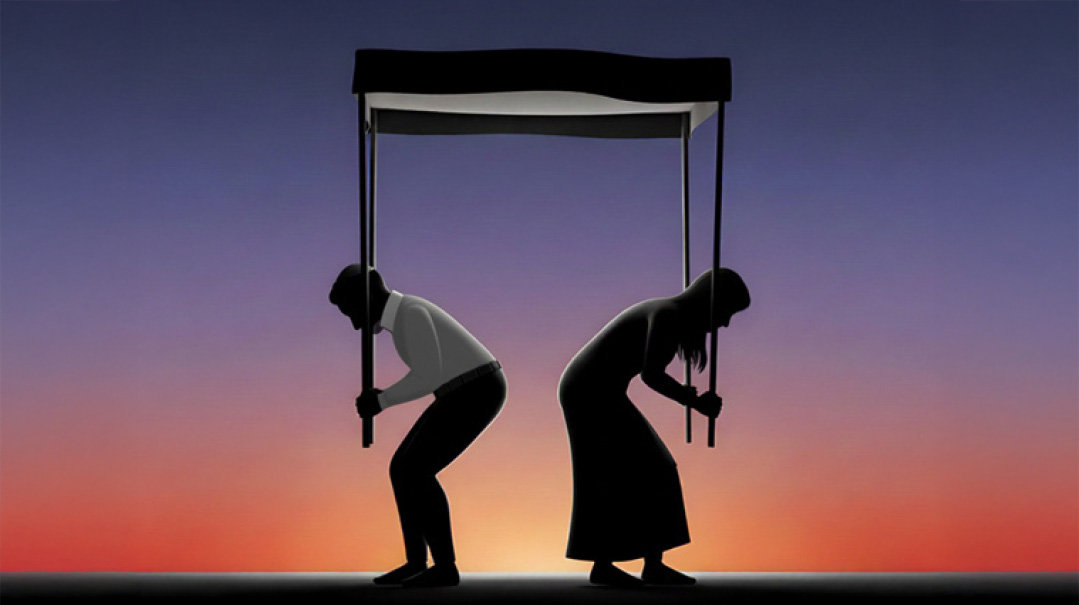Partners or Victims?

In the shadow of the authorities’ disdain for our values, any remaining team spirit is crumbling

"Mommy, did you hear about the wedding?” It was Wednesday night last week and my older children had just heard the news about a Givat Ze’ev wedding busted by police due to noncompliance with the COVID restrictions.
Soon a single image surfaced, a dazed young man propelled past his parents’ door by police forces as blood streamed down his face. Then the reports: the screams of the mother facing arrest at her child’s wedding, the chassan describing his new kallah vomiting, the family trying to shield their living room from a police invasion.
My children were uncharacteristically quiet, pensive. I think we all knew that there was likely another side to this story. We are in the midst of a pandemic with too many victims and too little compliance with regulations, and no one envies the police’s job.
But this wasn’t a mass event in an illegal wedding hall. It was already constrained far tighter, far smaller than any young couple’s dreams: just family and maybe some friends in a living room and garden. And then there was the timing, and the manner, and the violence, and the callousness…what kind of nightmare had this wedding turned into? How could the young couple possibly get off to a positive start, my children wondered, after their special night had taken on the undertones of a pogrom?
Something shifted that night in our perception. We know that public gatherings can be dangerous and we know it’s our sacred obligation to exercise caution and keep to the rules. We know that the price of noncompliance can be a life cut short, a wailing funeral announcement circling through our neighborhood, a family that will never be whole again.
But that night, despite everything we knew, we saw the wedding party as the victim of a government that couldn’t or wouldn’t understand our community’s values.
The lockdown announcement in New York, although in a different location with different players and different considerations, seemed to hammer home the same theme. Virtually everyone I know agrees that our community should demonstrate compliance. But even as we disapprove of the maskless and even as we condemn the protests, where do our sympathies lie, and why?
This isn’t just a question of logic versus emotion. It’s something bigger. It doesn’t take a psychologist to realize the massive strategic error here. Instead of positioning the chareidi community as a partner in the fight against COVID — a fight we hold a very personal stake in winning — the authorities have turned us into victims of persecution. And victims follow a very different script than do partners.
To be honest, this wasn’t a sudden transformation. We’ve felt the sting of discrimination for months already, watching politicians justify (or glorify) demonstrations for social or political issues while dismissing the value of communal prayer. We’ve heard statements along the lines of “so just postpone the weddings” or “just daven alone on Yom Kippur” or “who needs yeshivah right now” in all kinds of permutations and combinations. It’s grown increasingly clear that our values are not valued. Now the events of last week — in both Israel and New York — seem to have finalized our role in this dynamic.
“Victims of discrimination” is a shoe that slips right on to us, because of so much of our history and so many past policies. It’s familiar, even comfortable — we’re used to being persecuted and victimized. But the authorities committed a grotesque mistake by bringing us here. Because that’s the last place we need to be right now, for everyone’s sake.
When the pandemic originally struck it was clear that the greatest level of religious observance was any restriction that preserved human life. But as the months have passed, so many new questions have arisen.
Now we’re all wondering whether the danger has become less stark, less absolute. We’re wondering whether the costs of those extreme life-saving measures endanger lives too. Most of all, we’re wondering whether it’s possible to find a working model that will balance between our prime values of physical existence and spiritual sustenance, some sort of system allowing spiritual, communal, familial and personal life to function in a semi-normal way without needless danger to the vulnerable.
Many, possibly most, chareidi families and communities have taken steps to find that middle road. They’ve figured out ways to learn, to daven, to celebrate simchahs and to mourn while following guidelines. They’ve improvised and thought out of the box, trying their hardest to live their priorities even when those priorities sometimes seem to collide. It may have meant porch minyanim, backyard weddings, aggressive antibody tests, shiurim delivered behind plexiglass. But the willingness was there, because we were on a team fighting together.
Now, in the shadow of the authorities’ disdain for our values, any remaining team spirit of collaboration and cooperation is crumbling. And our self-perception is morphing from partners to victims.
Victims don’t tend to take responsible action. Instead they lash out and latch onto those who will voice their grievances even in unproductive, disturbing, or violent ways. Now that we’ve been targeted, do we still see ourselves as part of the team?
Ultimately, we will lose out — and lose lives — if we fall into this narrative of persecutor and victim. But it’s so tempting at this point to follow the script. Can we still aim for that middle road when we’re feeling attacked and defensive, when so much of what we value has been callously dismissed, and when the usual authorities — be they medical, communal, governmental — have lost our trust?
I remember my children’s troubled faces, I remember their silence as they took in that nightmare wedding scene. I pull my mask a little tighter and I wonder.
(Originally featured in Mishpacha, Issue 832)
Oops! We could not locate your form.






